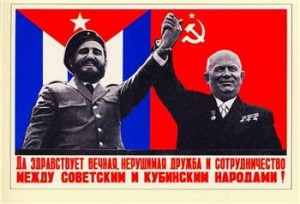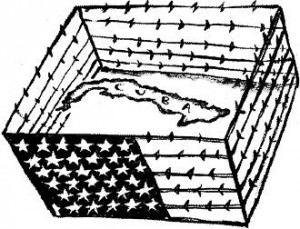Generational Perceptions
March 1, 2012 by admin
One of the most interesting concepts today when looking at how different people in the United States perceive Cuba is that there is a stark generational difference between the generation that grew up prior to the declaration of the “Special Period in Time of Peace” and those who were born and raised in the 1990s, or my generation. The main difference is that whereas by and large the older generation knows pretty much only bad ideas about Cuba, my generation, save a small group of young adults and students who are self-motivated or take classes, know approximately nothing about Cuba. It appears as if there is a quite simple explanation for this: the end of the Cold War and fading of the prominence of socialism on the world stage coupled with the erosion of support among conservatives and older Cuban Americans.
As it were, the Cold War was a conflict between the two largest superpowers in the world: the USA and the Soviet Union. Prior to the collapse of the Soviet Union, Cuba was seen as a proxy state (despite Havana and Moscow not agreeing on several issues) in the Western Hemisphere for the Eastern Bloc to use. During the Cold War the United States used extensive resources to oppose Cuba in all manners possible: assassination plots against Fidel, actual armed invasion, and naturally the embargo. Essentially, Cuba was a much bigger deal for the United States from the 1960s until 1990; it meant something else—because it was affiliated with the Eastern Bloc it was a physical manifestation of the Cold War only 90 miles from the United States. This is how the older generation in our country learned about Cuba. They were born and raised in a time of anti-communist fervor, and Cuba was one of the easiest targets because it was nearby, and the United States was much more powerful. They learned of Cuba as the Soviet pawn, and that’s one of the reasons older generations generally know only negative things about Cuba.
So we move on to my generation, who knows shockingly little about Cuba or its history, because it is not relevant to our own. This is because the focus in the United States was past Cuba’s communism and past the Cold War as we grew up; the collapse of the Soviet Union meant the triumph of the United States and Cuba had thus faded into irrelevance. After the declaration of the Special Period and collapse of the Cuban economy, the small socialist country 90 miles away presented no more threat, real or perceived, to the United States: out of sight, out of mind. This is how my generation learned about Cuba, via small blurbs in about its basic history in textbooks or a passing mention that we were not allowed to go there. We don’t really know anything because the older exile community in Miami was fading away and becoming less vocal as we were growing up. As that older exile community faded, they were being replaced by a younger generation who didn’t have any life experience in Cuba to speak of and saw Cuba differently than their parents. We don’t perceive Cuba as a threat, and our national security focus has been drawn to the Middle East in Afghanistan and Iraq. The word “Cuba” doesn’t have an emotional attachment hung to it, so we view Cuba in a much different light than previous generations.
We know nothing of Cuba in part due to the embargo as well; it has taken several generations but an embargo blocks a transfer of ideas and knowledge as well as goods. But however limited our generation’s knowledge as a whole may be, there’s so much potential to study and learn from the small Caribbean country.
Sources:
http://isla.igc.org/Features/Cuba/cuba2.html
One Response to “Generational Perceptions”
Leave a Reply
You must be logged in to post a comment.



go to katycookphotography.com